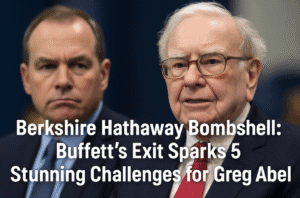Berkshire Hathaway Bombshell: Buffett’s Exit Sparks 5 Stunning Challenges for Greg Abel
Warren Buffett, the iconic 94-year-old CEO of Berkshire Hathaway, will step down in 2025, concluding a 60-year tenure that transformed a struggling textile firm into a $1.16 trillion conglomerate. His successor, Greg Abel, 62—a trusted executive since 1992 and vice chairman since 2018—faces the monumental task of steering a portfolio spanning insurance, railroads, energy, and consumer brands. While Buffett’s folksy wisdom and value-driven strategy fueled unprecedented growth, Abel must navigate challenges like deploying $347 billion in cash, preserving Berkshire’s unique decentralized culture, and maintaining investor confidence in a post-Buffett era.
Shareholders, though nostalgic, express cautious optimism, with Apple CEO Tim Cook endorsing Abel’s capabilities. The transition marks a historic shift for corporate America, testing whether Abel can uphold Buffett’s legacy while adapting to modern economic pressures. As Buffett exits, his philanthropic pledges and enduring principles remain central to Berkshire’s identity, leaving Abel to write the next chapter of this capitalist saga.

Berkshire Hathaway Bombshell: Buffett’s Exit Sparks 5 Stunning Challenges for Greg Abel
The investing world is bracing for a seismic shift as Warren Buffett, the 94-year-old visionary behind Berkshire Hathaway, prepares to step down as CEO at the end of 2025. His successor, Greg Abel, 62, will inherit the reins of a $1.16 trillion conglomerate—a testament to Buffett’s six-decade transformation of a struggling textile mill into a global empire. The announcement, made at Berkshire’s iconic annual shareholder meeting in Omaha, marks the end of an era defined by unparalleled growth, folksy wisdom, and a unique corporate culture.
The Buffett Legacy: From Omaha to Global Dominance
Buffett’s journey with Berkshire began in 1965. Alongside his late partner Charlie Munger, he built a sprawling portfolio of nearly 200 businesses, from Geico and BNSF Railroad to Dairy Queen and See’s Candies. Under his leadership, Berkshire’s stock soared by an astonishing 5,502,284%, outperforming the S&P 500 for decades. Known for his frugal lifestyle (he still lives in the Omaha home he bought for $31,500 in 1958) and philanthropic pledges, Buffett’s $168 billion fortune—nearly all in Berkshire stock—will eventually fund charitable trusts managed by his children.
Why Now? The Timing of Transition
Buffett’s decision, while anticipated, still stunned shareholders. He emphasized Abel’s readiness, stating, “Greg can do better,” and revealed the board had not been forewarned, though his children (and Berkshire directors) were privy to the plan. The transition reflects Buffett’s meticulous succession planning, with Abel groomed since 2018 as vice chairman and publicly anointed as heir apparent in 2021.
Greg Abel: The Low-Profile Successor
Abel, a Canadian-born executive, joined Berkshire’s energy division in 1992 and later led it for a decade. Described as pragmatic and collaborative, he’s already assumed critical roles in capital allocation and operational oversight. At the meeting, Abel hinted at a more hands-on approach: “More active, but hopefully in a very positive way.” Investors, however, will watch closely to see if he can maintain Berkshire’s “Buffett premium”—the intangible value tied to the CEO’s legendary status.
Challenges on the Horizon
Abel faces daunting tasks:
- Deploying $347 Billion in Cash: Buffett struggled to find “elephant-sized” acquisitions in recent years. Abel must balance growth with value discipline.
- Preserving Culture: With Berkshire’s decentralized model and unique shareholder culture, Abel must prove he can uphold its ethos. Howard Buffett, Warren’s son, is expected to become non-executive chairman to aid this effort.
- Investor Confidence: Analyst Cathy Seifert (CFRA Research) notes the risk of a “leadership discount” without Buffett’s aura.
Shareholder Sentiment: Nostalgia Meets Optimism
The annual “Woodstock for Capitalists” drew mixed emotions. Longtime attendee Cole Smead called it “the end of an era,” while Apple CEO Tim Cook expressed confidence in Abel’s capabilities. Though Berkshire vows to continue its shareholder festivities, attendance may dip post-Buffett.
The Road Ahead: Innovation or Continuity?
Buffett’s departure raises existential questions. Will Abel pivot toward tech investments or sustain Berkshire’s traditional sectors? Can he navigate geopolitical uncertainties and Trump-era tariffs? And will he ever approve a dividend—a move Buffett long resisted?
Final Thoughts: A New Chapter for Capitalism’s Icon
Warren Buffett’s exit closes a chapter in financial history, but his principles—value investing, patience, and integrity—remain embedded in Berkshire’s DNA. As Greg Abel steps into the spotlight, the world will watch whether he can honor Buffett’s legacy while carving his own path. For now, the Oracle’s final words resonate: “Greg should become CEO. I’ve got zero intention of letting go—but the future is his.”
You must be logged in to post a comment.